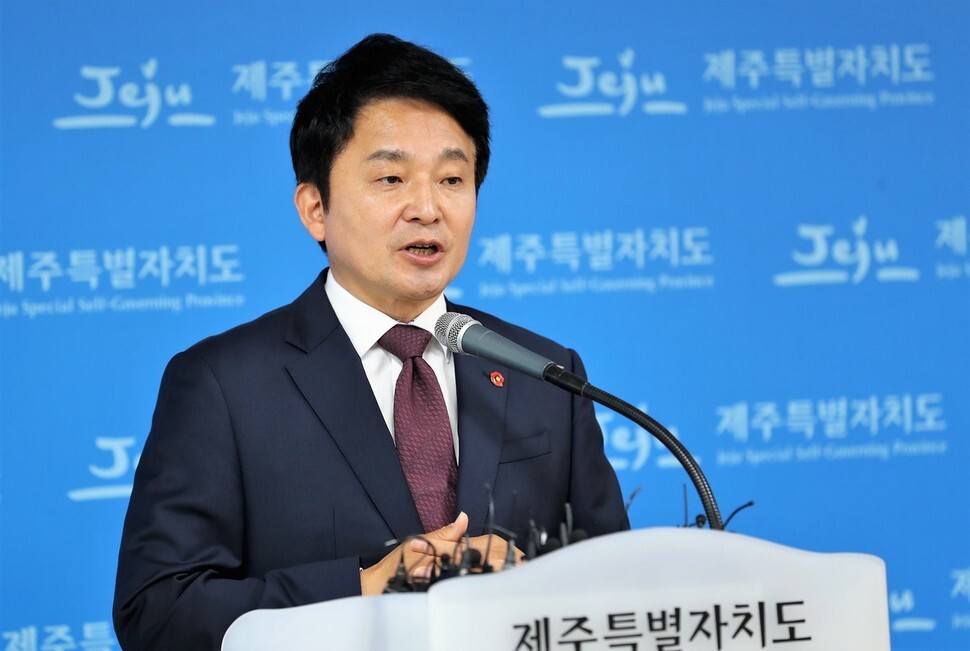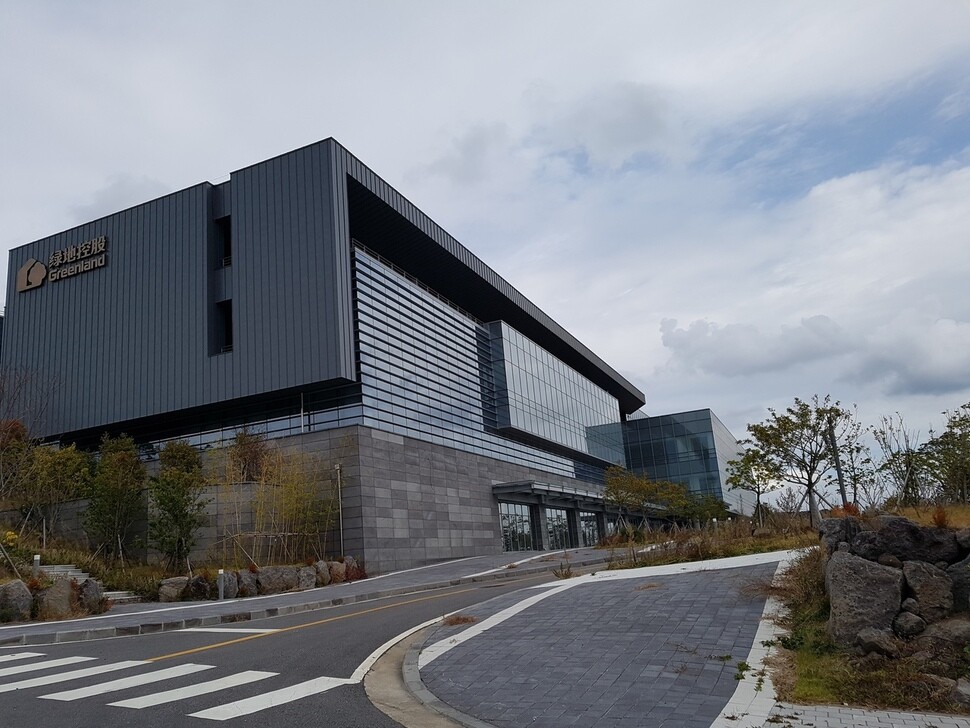hankyoreh
Links to other country sites 다른 나라 사이트 링크
Jeju grants permit for South Korea’s first for profit hospital

South Korea’s first ever for-profit hospital is opening on Jeju Island. In a press conference on the afternoon of Dec. 5, Jeju Gov. Won Hee-ryong announced a decision to grant a “conditional establishment permit” for Greenland International Hospital, which has been pursued on Jeju with Chinese investment. Treatment would only be permitted for foreign medical tourists, with strict prohibitions on use by South Korean nationals, he explained.
“This was an unavoidable choice made after much debate for the sake of Jeju’s future,” Won said.
“I apologize to the people of Jeju for failing to follow the results of the deliberative polling committee,” he added.
Won went to say that treatment would be “limited to four departments, namely plastic surgery, dermatology, internal medicine, and family medicine.”
“Since neither the National Health Insurance Act nor the Medical Care Assistance Act applies, this would not affect national health insurance or other areas of the domestic public healthcare system. We will do our best to ensure that fears of the public service of healthcare being weakened are not borne out,” he continued.
Won’s decision on Dec. 5 to permit the hospital’s opening came after two months of debate following a deliberative polling committee’s recommendation in early October to disallow the for-profit hospital’s establishment. Among the factors reportedly weighed in his decision were the potential repercussions of barring the hospital’s opening, including the possibility of diplomatic frictions with Beijing, a blow to South Korea’s international reputation, and costly damage suits.
But the debate over Greenland International Hospital as South Korea’s first non-profit medical institution continues to rage fiercely. Following the “conditional establishment permit” announcement on Dec. 5, the Korean Medical Association (KMA) and public health groups sent messages decrying what they described as an “opening salvo for for-profit healthcare.”
A for-profit hospital is a medical corporation that operates under a similar approach to a stock company, with the power to distribute profits to investors. All of South Korea’s private hospitals are non-profit medical corporations where profits must be reinvested back into the respective institution’s research, personnel, and other costs.
Opinions are fiercely divided on both sides. Supporters of for-profit hospital stress advantages including high-quality medical services and effects in boosting the medical industry as foreign patients are brought in. Opponents have voiced concerns about a potential collapse for the public healthcare system and polarization of medical services as treatment costs rise. Reflecting this, Won stressed that the conditional establishment permit strictly barred use by South Korean nationals and would be revoked in the event of violations.

Concerns about opening the floodgates for for-profit hospital expansion
The question is whether the spread of for-profit hospital can be blocked simply by restricting treatment to foreign medical tourists who are not subject to national health insurance.
“Jeju made a promise it can’t keep,” argued Kim Chang-yup, a professor at the Seoul National University Graduate School of Public Health.
“As the hospital faces problems maintaining profitability, it’s going to ask for permission to treat South Koreans who are subject to national health insurance, and other healthcare investors are going to demand the necessary legal and institutional changes for for-profit hospital establishment,” he predicted. The concern is that the South Korean healthcare system as a whole faces a greater threat of collapsing once the floodgates are opened in terms of for-profit hospital expansion.
Indeed, materials published by Jeju Province in 2016 claimed that while Greenland International Hospital would “mainly” be for foreign medical tourists, South Koreans would “also be able to receive treatment.” The Special Act on the Establishment of Jeju Special Self-Governing Province, which serves as a basis for the for-profit hospital establishment permit, includes no provisions restricting treatment to foreign nationals. With the Medical Services Act stating that health institutions cannot refuse treatment to patients without legitimate grounds, public health and healthcare groups argue that this amounts to permission to treat South Korean nationals.
Moon pledged to bar establishment of for-profit hospitals
Underlying these concerns is a sense of distrust toward the Moon Jae-in administration. The Ministry of Health and Welfare approved the Greenland International Hospital in 2015, during the administration of predecessor Park Geun-hye. As a presidential candidate, Moon pledged to “bar the establishment of for-profit hospital corporations.” He also stated his opposition to the establishment of a non-profit hospital on Jeju Island.
“The Ministry of Health and Welfare’s failure to actively pursue cancelation of the project plan’s approval even after a new administration was elected amounts to tacit approval of Gov. Won Hee-ryong’s decision,” said Woo Seok-gyun, co-representative of the group Association of Physicians for Humanism.
In response, a ministry official said, “We mentioned the idea of acquiring the already-completed Greenland International Hospital within the region, but there was no response [from Jeju Province].”
“It is our consistent position that we will not pursue the profitization of healthcare,” the official said.

Many observers are also concerned about the so-called “vampire effect” as expensive treatment costs and other “bad management practices” by the first non-profit hospital spread to other healthcare institutions.
“If regular hospitals follow suit with the commercial treatment activities at for-profit hospitals, the result could be an increase in wasteful healthcare costs, and it could end up undermining the health care insurance system,” said Inha University medical school professor Choi Kyu-jin.
A for-profit hospital is entitled to decide its own treatment costs. In the US, costs at for-profit hospitals average about 19% higher than at non-profit hospitals. For-profit hospitals also hire fewer workers. Greenland International Hospital has hired a total of 134 staff members – only 58 of whom are medical personnel such as physicians and nurses.
Serious concerns have also been raised about increased healthcare polarization. In countries where for-profit hospitals are allowed, public healthcare institutions generally account for over 70%; at 5.4%, South Korea ranks among the lowest in the OECD.
“Because of the strongly commercial nature of private hospitals in South Korea, it’s inevitable that there would be greater concerns about the permission of for-profit hospitals further compromising the public service function of healthcare,” said SNU medical school professor Kim Yoon.
By Hwang Ye-rang and Park Hyun-jung, staff reporters
Please direct comments or questions to [english@hani.co.kr]

Editorial・opinion
![[Column] Park Geun-hye déjà vu in Yoon Suk-yeol [Column] Park Geun-hye déjà vu in Yoon Suk-yeol](https://flexible.img.hani.co.kr/flexible/normal/500/300/imgdb/original/2024/0424/651713945113788.jpg) [Column] Park Geun-hye déjà vu in Yoon Suk-yeol
[Column] Park Geun-hye déjà vu in Yoon Suk-yeol![[Editorial] New weight of N. Korea’s nuclear threats makes dialogue all the more urgent [Editorial] New weight of N. Korea’s nuclear threats makes dialogue all the more urgent](https://flexible.img.hani.co.kr/flexible/normal/500/300/imgdb/original/2024/0424/7317139454662664.jpg) [Editorial] New weight of N. Korea’s nuclear threats makes dialogue all the more urgent
[Editorial] New weight of N. Korea’s nuclear threats makes dialogue all the more urgent- [Guest essay] The real reason Korea’s new right wants to dub Rhee a founding father
- [Column] ‘Choson’: Is it time we start referring to N. Korea in its own terms?
- [Editorial] Japan’s rewriting of history with Korea has gone too far
- [Column] The president’s questionable capacity for dialogue
- [Column] Are chaebol firms just pizza pies for families to divvy up as they please?
- [Column] Has Korea, too, crossed the Rubicon on China?
- [Correspondent’s column] In Japan’s alliance with US, echoes of its past alliances with UK
- [Editorial] Does Yoon think the Korean public is wrong?
Most viewed articles
- 1‘We must say no’: Seoul defense chief on Korean, USFK involvement in hypothetical Taiwan crisis
- 2N. Korean delegation’s trip to Iran shows how Pyongyang is leveraging ties with Moscow
- 3Amnesty notes ‘erosion’ of freedom of expression in Korea in annual human rights report
- 4‘Weddingflation’ breaks the bank for Korean couples-to-be
- 5[Reportage] On US campuses, student risk arrest as they call for divestment from Israel
- 6[Column] Park Geun-hye déjà vu in Yoon Suk-yeol
- 7Korea sees more deaths than births for 52nd consecutive month in February
- 8[Editorial] New weight of N. Korea’s nuclear threats makes dialogue all the more urgent
- 9Will NewJeans end up collateral damage in internal feud at K-pop juggernaut Hybe?
- 10[Guest essay] The real reason Korea’s new right wants to dub Rhee a founding father